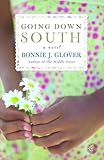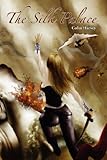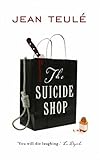 Going Down South: A Novel by Bonnie Glover
Going Down South: A Novel by Bonnie GloverMy review
rating: 2 of 5 stars
This is a reading-group book. You can tell because it's about mothers and daughters, because it has race- and gender-based complications, and because it has Reading Group Questions at the back. Unfortunately, I don't think I found it as edifying as I was supposed to. Going Down South has a solid sense of time and place and culture, even while jumping around between them, but is weaker in plot and characterization, which make that sense of the settings more difficult to appreciate and learn from.
The first two sections of the book constitute the Going Down South itself. They use a car trip from Brooklyn to small-town Alabama as a frame for a series of flashbacks setting up the story, first from the point of view of Olivia Jean, a teenager whose unplanned pregnancy is the cause of the trip (her parents want to hide her away until the baby is born), and then of Daisy, her mother, who hasn't been back to see her mother in Alabama since she was a teenager herself and left home under unpleasant circumstances. The third section is told from the point of view of Birdie, Daisy's mother and Olivia Jean's grandmother, reflecting back on Daisy's childhood and her own as she waits for her family to arrive. This car-trip flashback structure is an interesting idea, but in practice, I found that it seriously screws up the pacing of both the reference-time story and the backstory, and I got frustrated with it very quickly.
The second half of the book is structured rather differently, with a floating point of view but a much straighter narrative thread. There are still plenty of flashbacks -- the three central characters are all working through their issues with themselves and each other, which requires much delving into the past -- but they are spaced in a more conventional fashion. This improves the pacing, and various other aspects of the storytelling improve as well. The characters -- all of whom come off as rather stock toward the beginning -- seem more nuanced and original, and the humor rings truer. (There is also less of the repetition and narratorial summaryishness that further bog down the first sections.) The ending is satisfying, if predictable, and rounds off the plot arc nicely.
As well as the book-group discussion questions, this edition of Going Down South also includes an interview with the author. Mostly nothing unexpected, but I did find one thing about it interesting: When the interviewer asked Glover to describe her characters and how she wrote them, she immediately pegged Olivia Jean as a gutsy and intelligent girl who just needs guidance, and said she didn't have any difficulty writing her or imagining her life, whereas she found her mother Daisy -- passionate, bitter, and pretentious -- much harder to understand and to write (though in the end she empathized with her more). However, from the reading side, I found Olivia Jean something of a cipher, while Daisy's inner life and motivations come through much better (at least in the second half). There may be a lesson in that, more than in what can be found in the text of the book.
View all my reviews.


















